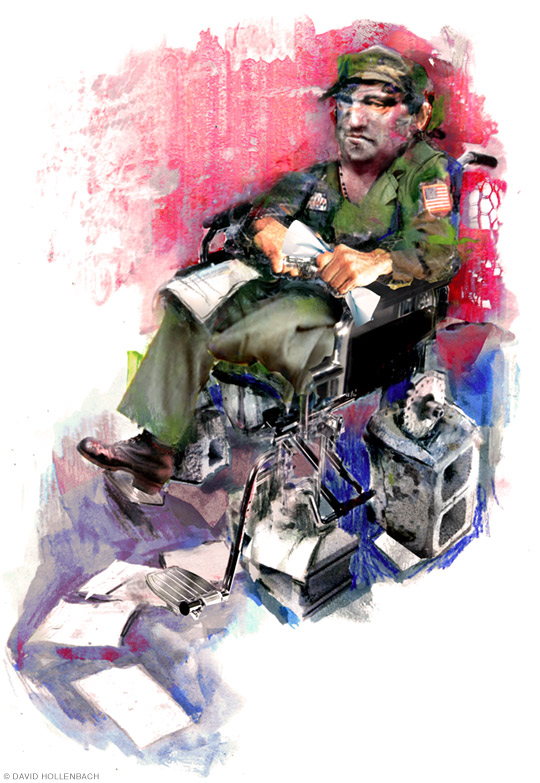
Veterans denied disability claims are thrown into a deeply broken system. They deserve better—and a solution is within reach.
By Richard Rosenbleeth
In November 2010, Wayne Gary Mote filed a claim with the US Department of Veterans Affairs (VA) asking for disability payments due to the heart condition he had developed from exposure to Agent Orange. He said he had flown several classified missions in Vietnam and produced affidavits from fellow veterans to support his claim. The VA said it could find no record of that service and rejected his claim. Mote appealed the decision in 2013, but he died later that year. His widow then continued the fight for disability payments. But she too passed away before the claim could be resolved.
The system for resolution of VA disability appeals is a national disgrace. Thousands of veterans die before their appeals are heard. Roughly 22 die by suicide per day, according to a study released by the VA in 2013 that found—like other studies—that veterans take their own lives at a higher rate than the general population. Many more suffer unnecessarily. Mote’s case is just one disturbing example of how unreasonable delays affect veterans and their families who have waited years for resolution of their disability claims.
To lodge an appeal, veterans must file a Notice of Disagreement to the VA. The VA must then issue a Statement of the Case. On average, the Statement of the Case takes 500 days to be issued. At that point the veteran has 60 days to appeal, which takes 37 days on average. Then the appeal must be certified—a process that typically takes 773 days. But the bureaucratic marathon has another lap: 321 days, on average, for the appeal to be docketed with the Board of Veterans’ Appeals.
In total, from the Notice of Disagreement to a decision by the Board of Veterans’ Appeals, the process can take more than five-and-a-half years. Yet incredibly, even this is not the end for many veterans. Some cases are remanded to the VA for further proceedings by the Board of Veterans’ Appeals or the courts, which involves further delay. In such cases, the total delay can stretch to seven years.
If there is any doubt about the human cost of this broken system, it was dissolved by a recent estimate by the VA Inspector General that 7 percent of cases are “resolved” by the death of the veterans. As of earlier this year, some 425,000 appeals were outstanding.
These disability claims relate to service-connected injuries/illnesses for which the government offers compensation based on a rating system. The VA decides eligibility and amount. Veterans depend on these benefits for basic necessities such as food, clothing, housing, and medical care. Their delay in obtaining them is not new. Rising numbers of claims stemming from the wars in Iraq and Afghanistan exacerbated the situation—just as many experts had feared at the outset of these conflicts in the early 2000s. A panel of Ninth Circuit judges found, in Veterans for Common Sense v. Shinseki (2012), that veterans were being denied due process—but the full Court later reversed the panel and the Supreme Court opted not to consider the appeal.
For years, I have led an effort to reduce this unconscionable delay. I first proposed an Alternative Dispute Resolution program similar to the highly successful Philadelphia Judge Pro Tem program as a way to speed up decisions. The American College of Trial Lawyers (ACTL) agreed to provide Fellows as Judges Pro Tem to handle appeals to the Board of Veterans’ Appeals. The board rejected this approach, citing the absence of statutory authority for such a system even though the requisite rule changes were eminently possible.
In 2008, the then secretary of the VA agreed to pilot a Pro Tem program as proposed. Yet a veterans organization representing claimants declined to participate on the grounds that the veterans benefits system was a non-adversarial system, and this program would change that. So the pilot program was never implemented. Thereafter, the VA and veterans organizations resisted further proposals that aimed to address their objections. Congress did enact some process changes in recent years, but these show little sign of improving delays.
Finally, in 2016, the ACTL brought a lawsuit against the VA Secretary on behalf of 12 veterans. In that process, I concluded that mandamus (when a higher court directs a lower court or official to take action) was the appropriate remedy. So the lawsuit sought a writ of mandamus and a finding that the delay is unreasonable and violates due process. The Veterans’ Court denied relief, whereupon an appeal was taken to the US Court of Appeals for the Federal Circuit. That court reversed the Veterans’ Court and changed the mandamus standard, granting highly significant relief to veterans in individual cases in Martin v. O’Rourke (2018).
Broader due process relief to all veterans was not granted, however. The case was remanded to the Veterans’ Court for further proceedings applying the new mandamus standard. In a concurring opinion, Judge Kimberly A. Moore laid out the moral stakes. “The men and women in these cases protected this country and the freedoms we hold dear; they were disabled in the service of their country; the least we can do is properly resolve their disability claims so that they have the food and shelter necessary for survival. It takes on average six-and-a-half years for a veteran to challenge a VBA determination and get a decision on remand. God help this nation if it took that long for these brave men and women to answer the call to serve and protect. We owe them more.”
After remand, several of the claims on appeal in the Martin case were settled.
The Mote case remained unresolved. After that case was remanded, the Veterans’ Court failed to apply the proper mandamus standard, and a second appeal was taken to the Federal Circuit. That appeal was once again decided in favor of Mrs. Mote. The case was again remanded to the Veterans’ Court on September 28, 2020, and thereafter the VA granted Mote disability benefits. In a perverse demonstration of the system’s defects, Mrs. Mote passed away before she could receive them.
Although the litigation was successful in achieving relief for veterans in individual cases, it did not achieve the broad due process relief that veterans deserve. Courts have been reluctant to deal with due process relief on a class basis for two reasons: a determination by some judges that courts lack sufficient statutory authority over the VA; and the conclusion that Congress is the proper entity to address the problem.
It is clear now that broad court relief to fix the delay problem is not feasible. The fight for them, begun in 2006, must be continued by other means.
Given the current state of play, a single proposal promises substantial improvement—whether it is implemented by the Board of Veterans’ Appeals or Congress itself. Either one of those bodies could fix the problem by adopting our proposal for a system of arbitration for appeals that remain outstanding for one or two years. This could be accomplished by Congress amending an existing statute, or the board amending one of its rules. It is a simple fix.
The VA’s motto is “To care for him who shall have borne the battle and for his widow, and his orphan.” In practice, the department falls far short when it comes to the hundreds of thousands of veterans who lodge good-faith appeals to its decisions. Some have said the VA’s policy is “Deny until they die.”
President Joe Biden Hon’13 can demonstrate real substance behind the support he has articulated for Americans who serve our country in uniform by directing his new VA secretary, Denis McDonough, to take up this fight on their side.
Richard M. Rosenbleeth W’54 L’57 is a retired partner at the Philadelphia law firm Blank Rome and a former chair of its litigation department. He is a fellow of the American College of Trial Lawyers and the International Academy of Trial Lawyers. He is a proud “Mungerman,” having played football at Penn under the legendary coach George Munger. A version of this essay appeared in the Penn Law Journal’s Winter 2021 issue.




